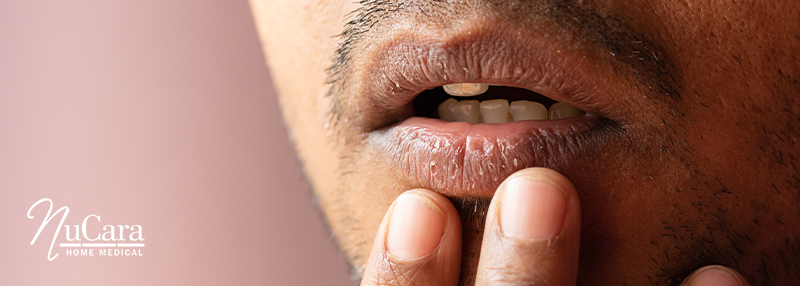NuCara Home Medical
Updated Wed November 26, 2025
Published Under: CPAP Therapy & Tips

For millions of people around the world, Continuous Positive Airway Pressure (CPAP) therapy is a lifesaver. It helps alleviate the symptoms of sleep apnea, allowing individuals to breathe easily and sleep soundly. However, one of the most common complaints about CPAP therapy is dry mouth. At NuCara Home Medical, we understand the frustration and discomfort that comes with a dry mouth, and we're here to help you overcome it.
The Culprit: CPAP-Induced Dry Mouth
CPAP therapy works by delivering a constant flow of pressurized air into the airways through a mask. While this pressure helps keep the airways open, it can also cause the mouth to dry out. The air flow can dry out the mucous membranes in the mouth, nose, and throat, leading to:
- Dryness and irritation in the mouth and throat
- Cracked lips
- Soreness and discomfort
- Difficulty speaking and swallowing
- Increased risk of mouth infections and tooth decay
Tips to Combat CPAP-Induced Dry Mouth
1. Humidify Your Air
Using a humidifier with your CPAP machine can make a huge difference. The humidifier adds moisture to the air, helping to combat dryness and irritation in the mouth and throat. Pick up a humidification chamber at NuCara Home Medical. Simply fill out our product order request form to get started.
2. Choose the Right Mask
Select a CPAP mask that fits comfortably and allows for minimal air leakage. A full-face mask or a nasal mask with a mouth seal can help reduce dry mouth.
3. Use a Chin Strap
A chin strap can help keep your mouth closed while you sleep, reducing the amount of air that escapes through your mouth and minimizing dryness.
4. Stay Hydrated
Drink plenty of water throughout the day to keep your mouth and throat hydrated. Avoid sugary drinks and caffeine, which can exacerbate dry mouth. Here are some tips to help you stay hydrated: Five Simple Tips to Stay Hydrated
5. Use a Saline Rinse
Rinse your mouth and throat with a saline solution before bed to help moisturize the mucous membranes.
6. Try a Dry Mouth Spray
There are various dry mouth sprays available that can help moisturize the mouth and throat. Look for sprays containing xylitol, which can help stimulate saliva production.
7. Experiment with Different CPAP Settings
Adjusting the pressure settings on your CPAP machine may help reduce dry mouth. Consult with your healthcare provider to find the optimal setting for you. Stop by your local NuCara for help from our respiratory experts: Locations | NuCara Home Medical
Sleep COMFORTABLE WITH NuCara Home Medical
Dry mouth is a common complaint among CPAP users, but it doesn't have to be a deal-breaker. By following these tips, you can reduce the discomfort and frustration associated with a dry mouth and enjoy a more comfortable CPAP experience. At NuCara Home Medical, we're committed to helping you breathe easily and sleep soundly. Contact us today to learn more about our CPAP therapy solutions and how we can help you overcome dry mouth.
Find PAP Products TodayShop In Store
Comments